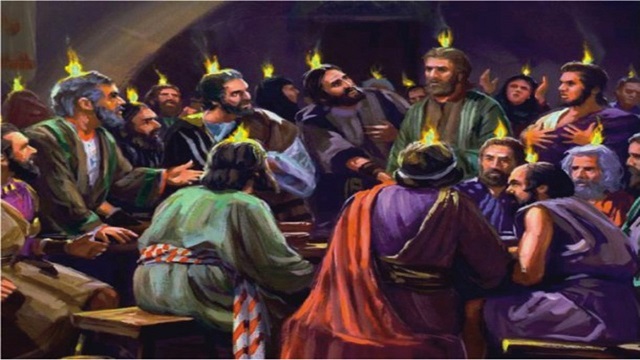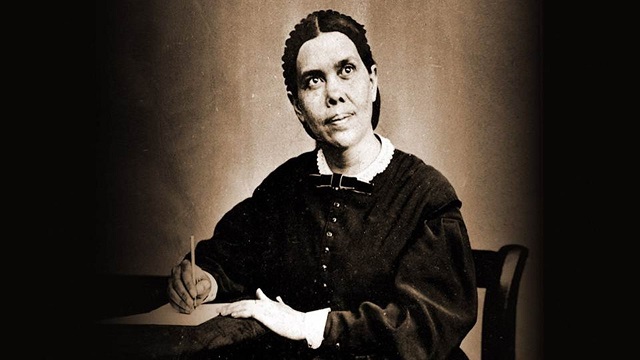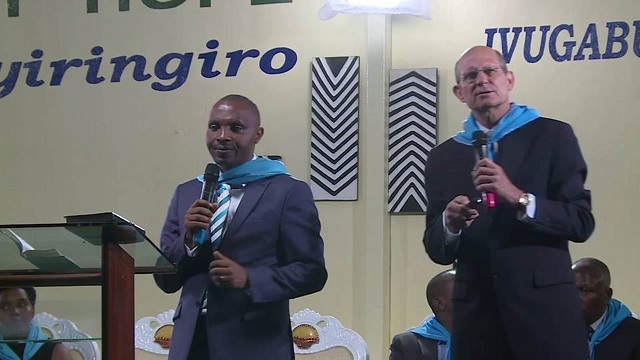LESSON 8
THE GIFT OF TONGUES: PART 2
You are welcome to another edition of Insights from God's Word, a Bible study programme that is committed to sharing God's Word by allowing the Bible to speak for itself.
In this edition, we continue with our series on The Gifts of the Spirit. The topic for this study is: The Gift of Tongues: Part 2. In the part one of this lesson, we noted that the main purpose for which the gift of tongues was given to the church was to overcome language barriers as the disciples proclaimed the gospel of Christ throughout the world. In this second part of our study on tongues, we will consider the various examples of the manifestation of this gift as the disciples heeded the command of Christ to proclaim the gospel to the world. The lesson is categorised into four sub-sections as follows:
1) THE DAY OF PENTECOST
The first manifestation of the gift of tongues in Scripture is recorded in Acts 2. Acts 2 describes the events that took place on the day of Pentecost. We read the following from Acts 2:1-11:
2:1 And when the day of Pentecost was fully come, they were all with one accord in one place.
2:2 And suddenly there came a sound from heaven as of a rushing mighty wind, and it filled all the house where they were sitting.
2:3 And there appeared unto them cloven tongues like as of fire, and it sat upon each of them.
2:4 And they were all filled with the Holy Ghost, and began to speak with other tongues, as the Spirit gave them utterance.
2:5 And there were dwelling at Jerusalem Jews, devout men, out of every nation under heaven.
2:6 Now when this was noised abroad, the multitude came together, and were confounded, because that every man heard them speak in his own language.
Key Explanation: This verse expressly declares that when the disciples spoke with tongues on the day of Pentecost, the multitudes were confounded or surprised because they HEARD the apostles speak in their own native languages. The rest of the passage provides us with rich explanations of the details:
2:7 And they were all amazed and marvelled, saying one to another, Behold, are not all these which speak Galilaeans?
2:8 And how hear we every man in our own tongue, wherein we were born?
2:9 Parthians, and Medes, and Elamites, and the dwellers in Mesopotamia, and in Judaea, and Cappadocia, in Pontus, and Asia,
2:10 Phrygia, and Pamphylia, in Egypt, and in the parts of Libya about Cyrene, and strangers of Rome, Jews and proselytes,
2:11 Cretes and Arabians, we do hear them speak in our tongues the wonderful works of God.
(Acts 2:1-11; Emphasis Added)
From the passage above, it is clear that on the Day of Pentecost, God bestowed the supernatural gift of tongues unto the disciples. We can deduce the following clear facts from the manifestation of this gift in Acts 2:
A) The gift of tongues in Acts 2 was associated with the outpouring of the Holy Spirit (review Acts 2:2-4).
B) The gift was given by God on the Day of Pentecost to bridge a language barrier that had arisen between the disciples and other Jews who hailed from various foreign nations across the globe.
C) As the verses 5, 8 and 11 of Acts 2 declare, all the Jews who had come from foreign nations across the world could HEAR the apostles speak in their mother tongues or languages, the wonderful works of God. These were not languages that the disciples knew or have studied. The Holy Spirit endowed them with the miraculous ability to speak in these foreign languages so they could communicate to the hearing and understanding of their fellow brethren.
D) The gift was given to propagate the gospel of Christ. From Acts 2:41, we learn that as the language barrier was broken through the gift of tongues, the disciples witnessed to their brethren about the resurrected Christ, and about three thousand souls believed and were baptized.
2) THE HOUSEHOLD OF CORNELIUS
The second place in Scripture where we read about the manifestation of the gift of tongues is in Acts 10. In Acts 10, a Gentile by the name of Cornelius had been praying for knowledge of the living God (see Acts 10:1-8). The Lord convinced Peter (who still held on to Jewish customs) with a remarkable vision to share the gospel with the household of Cornelius (see Acts 10:9-16). Peter obeyed the voice of the Holy Spirit and went to proclaim to this Gentile soldier and his household. Now, when Peter spoke about the resurrected Christ to the household of Cornelius, a miraculous phenomenon occurred in the house. We read about what took place in the household of Cornelius from Acts 10:44-48 as follows:
"10:44 While Peter yet spake these words, the Holy Ghost fell on all them which heard the word.
10:45 And they of the circumcision which believed were astonished, as many as came with Peter, because that on the Gentiles also was poured out the gift of the Holy Ghost.
10:46 FOR THEY HEARD THEM SPEAK WITH TONGUES, AND MAGNIFY GOD. Then answered Peter,
10:47 Can any man forbid water, that these should not be baptized, which have received the Holy Ghost as well as we?
10:48 And he commanded them to be baptized in the name of the Lord. Then prayed they him to tarry certain days."
(Acts 10:44-48; Capital Emphasis Added)
Some important insights we can deduce from this manifestation in Acts 10 are as follows:
A) The gift of tongues in Acts 10 was also associated with the outpouring of the Holy Spirit (review Acts 10:44-45, 47).
B) Considering the background of the two groups who met in Cornelius house, there is the likelihood of a possible language barrier. Peter and his brethren were from Jerusalem, while Cornelius, being a centurion, lived with servants and possibly soldiers, who could hail from anywhere within the Roman Empire. With the above background, we can deduce that Peter is likely to have spoken through an interpreter in the house of Cornelius, as the Spirit did not endow him with the gift of tongues at this time.
C) In Acts 10, the gift of tongues was bestowed not upon the disciples who already believed, but rather, upon Cornelius and his household. Through the outpouring of the gift of tongues on these Gentiles, God spoke loudly and clearly to Peter and the other Jewish brethren who were with him, that the Gentiles were now also beneficiaries of the salvation that is attained through the merits of Christ.
D) In Acts 10, the gift of tongues was also given in the context of the proclamation of the gospel.
E) In Acts 10, Luke records that Peter and the brethren who accompanied him from Joppa, HEARD the Gentiles speaking with tongues. Peter and his colleague disciples understood what the Gentiles spoke in tongues, and could interpret what they heard as magnifying God (review Acts 10:46). This action of praise to God by the household of Cornelius is not out of place in this context, especially after Peter had preached such a wonderful sermon about the hope that God offers to the world through Jesus. In their joyful praise to the Lord, the Holy Spirit made their language understandable to Peter and his brethren from Joppa. This gift on the Gentiles convinced Peter enough to accept the fact that the Gentiles also were now beneficiaries of the grace of God.
It is interesting to note that after this experience in the household of Cornelius, Peter was questioned by some of his brethren in Jerusalem concerning this issue. They could not understand why as a Jew he could enter the house of a Gentile to minister unto him. In Peter's response to these brethren, we gather certain points that help us to understand in a better manner the gift of tongues that was manifested in the household of Cornelius. From Acts 11:15-18, we read the apostle Peter's response as follows:
"11:15 And as I began to speak, THE HOLY GHOST FELL ON THEM, AS ON US AT THE BEGINNING.
11:16 Then remembered I the word of the Lord, how that he said, John indeed baptized with water; but ye shall be baptized with the Holy Ghost.
11:17 Forasmuch then as God gave them the LIKE GIFT as he did unto us, who believed on the Lord Jesus Christ; what was I, that I could withstand God?
11:18 When they heard these things, they held their peace, and glorified God, saying, Then hath God also to the Gentiles granted repentance unto life."
(Acts 11:15-18; Capital Emphasis Added)
In this testimony from Peter, we learn clearly that the Gentiles were endowed with the same gift of tongues from the Holy Spirit as the apostles experienced on the Day of Pentecost. What this means is that the tongues spoken by the Gentiles in the household of Cornelius was also a normal human language which could be heard and understood as that experienced by the apostles in Acts 2.
3) THE EPHESIAN BRETHREN
The third place in Scripture where we read about the gift of tongues is in Acts 19:1-7. The account there reads:
"19:1 And it came to pass, that, while Apollos was at Corinth, Paul having passed through the upper coasts came to Ephesus: and finding certain disciples,
19:2 He said unto them, Have ye received the Holy Ghost since ye believed? And they said unto him, We have not so much as heard whether there be any Holy Ghost.
19:3 And he said unto them, Unto what then were ye baptized? And they said, Unto John's baptism.
19:4 Then said Paul, John verily baptized with the baptism of repentance, saying unto the people, that they should believe on him which should come after him, that is, on Christ Jesus.
19:5 When they heard this, they were baptized in the name of the Lord Jesus.
19:6 And when Paul had laid his hands upon them, the Holy Ghost came on them; AND THEY SPAKE WITH TONGUES, AND PROPHESIED.
19:7 And all the men were about twelve."
(Acts 19:1-7; Capital Emphasis Added)
Some important insights we can deduce from this manifestation in Acts 19 are as follows:
A) The gift of tongues in this instance was also associated with the outpouring of the Holy Spirit (review Acts 19:6).
B) The account makes it clear that when Paul met these brethren at Ephesus, he freely began a conversation with them (review Acts 19:1-2). What this means is that the two parties understood each other. From this point, it is clear that the manifestation of the gift of tongues in Acts 19 did not occur at the meeting between Paul and the Ephesian brethren as there was no communication gap between the two parties.
C) Luke, who recounted this story in Acts 19, provides us with the important information that the Ephesian brethren utilised the gift of tongues they received from the Holy Spirit to prophesy (review Acts 19:6). What this means is that the gift of tongues that came upon the Ephesian brethren was not some unintelligible phenomena, otherwise Luke could not tell how it was utilised. Moreover, it is clear from the context of the passage that the Ephesian brethren did not prophesy (preach) to Paul. In fact, it was rather Paul who taught them about the Holy Spirit, after which they were baptised in the name of Jesus. This fact helps us to understand that when the Holy Spirit was poured on the Ephesian brethren, they actually were endowed with the gift of tongues to enable them to prophesy (proclaim) the gospel of Christ to people of diverse language backgrounds.
4) DOES THE OUTPOURING OF THE HOLY SPIRIT ALWAYS LEAD TO THE MANIFESTATION OF THE GIFT OF TONGUES?
Since all the three instances we have considered in relation to the gift of tongues involved the outpouring of the Holy Spirit, it is likely that someone may form the opinion that the outpouring of the Holy Spirit must always lead to the manifestation of tongues. However, a quick glance at some other Bible passages will help us to think differently. Two illustrations from the book of Acts will go a long way to prove this point:
A) When the disciples met to pray for boldness in Acts 4, even though the Holy Spirit was poured on them, the gift of tongues was absent. We read the account from Acts 4:31 as follows: "And when they had prayed, the place was shaken where they were assembled together; and they were all filled with the Holy Ghost, and they spake the word of God with boldness". In this instance, even though the Holy Spirit was poured on the disciples, so much so that the place was shaken, the gift of tongues was absent. The reason why the gift of tongues was not manifested at this time was basically because the disciples who had met for prayer were all Jews who understood each other. There was no communication gap or barrier to be resolved as there were no foreigners present (see Acts 4:23).
B) In Acts 8, we read about how Philip preached Christ to the people of Samaria. Many of the Samaritans believed and were baptised. However, after their water baptism, they were yet to receive the Holy Spirit. The rest of the story unfolds in the following passage:
"8:14 Now when the apostles which were at Jerusalem heard that Samaria had received the word of God, they sent unto them Peter and John:
8:15 Who, when they were come down, prayed for them, that they might receive the Holy Ghost:
8:16 (For as yet he was fallen upon none of them: only they were baptized in the name of the Lord Jesus.)
8:17 Then laid they their hands on them, and they received the Holy Ghost."
(Acts 8:14-17)
This account is similar to what we read from Acts 19 in relation to the Ephesian brethren. However, in this instance, even though the Samaritans received the Holy Spirit after the apostles had laid their hands on them, we note clearly that the gift of tongues was remarkably absent. The primary reason for the absence of the gift is basically that the Jews and Samaritans understood each other (see John 4:5-42). It is clear that since there was no communication gap between these two groups of people, there was no need for the manifestation of the gift of tongues in Samaria. The biblical insights we have gained from our study so far help us to understand that the gift of tongues is only poured out by the Holy Spirit when the proclamation of the gospel is being hindered by a language barrier that exists between the people gathered.
Exhortation: "6 And I saw another angel fly in the midst of heaven, having the everlasting gospel to preach unto them that dwell on the earth, and to every nation, and kindred, AND TONGUE, and people, 7 Saying with a loud voice, Fear God, and give glory to him; for the hour of his judgment is come: and worship him that made heaven, and earth, and the sea, and the fountains of waters" (Revelation 14:6-7; Capital Emphasis Added).
In our next study, we will consider the topic: The Gift of tongues: Part 3. We will be exploring the widely misinterpreted passage of 1 Corinthians 14. The Bible Study references for this study are 1 Corinthians 14:1-40, 1 Corinthians 13:1-3, Galatians 5:22-23, Luke 8:26-40 and Isaiah 1:18. Please do well to go through these passages before the next study is released.
Stay blessed and keep shining for King Jesus.
Maranatha!
Powered by White Throne Ministries
















